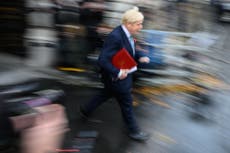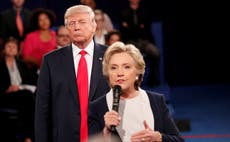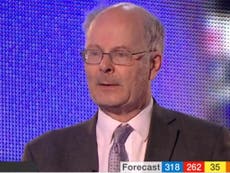Look carefully at the polls and it was clear that the US election would be too close to call
Given that the nine key states accounted for as many as 159 electoral college votes, a Biden win was always far from guaranteed


On Tuesday night, as Democrats felt the bitter taste of a set of early election results that fell short of their hopes and expectations, there was one point on which they and their journalistic inquisitors were inclined to agree on – the polls had got it wrong (again).
Indeed, many attempts at extrapolating the outcome in the electoral college on the back of the polls suggested that Joe Biden would clearly exceed the 270 mark needed to win. The Economist, for example, reckoned that Biden was heading for 356 college votes. YouGov put the figure even higher at 364. Yet in both instances they also indicated that the Democrat nominee was not sufficiently far ahead to be sure of victory.
Little wonder – for that was the collective message of the polls as a whole. Sure, on average the final polls of the overall national popular vote put Biden ahead by seven points. But at the same time, polls in each of the individual states suggested that there were no fewer than nine where the two principal protagonists were two points or less apart.
Given the limitations that apply to any polling, the only sensible conclusion that could be drawn in these states was that they were too close to call. After all, the historical record of polling in the US suggests that they can be as much as three percentage points adrift of each candidate’s tally – and thus as much as six points on the lead. And given that the nine key states accounted for as many as 159 electoral college votes, it was clear from the polls that a Biden win was far from guaranteed.
If the nine states were to be divided evenly between the two candidates, the Democrat nominee was expected to win. That was why he was the favourite. Indeed, if the key states were to break in the former vice president’s favour, the outcome in the electoral college might even be a “landslide” – a possibility that perhaps helped explain some of the high hopes in the Democrats’ ranks.
However, at the same time, if President Trump were to prevail in most of the nine states then he might just secure a second term.
As of late last night, these nine states included all five where the outcome was still close to call. However, Donald Trump prevailed in four, including Florida and Texas, and did so in each case by relatively comfortable margins.
It was these successes for the president that mean that he still had a chance of winning, and it was these states – together with the narrowness of Biden’s success in Michigan and Wisconsin – where the performance of the polls was open to some criticism. Yet at the same time, the polls also quite accurately identified the states on which the outcome will eventually turn.
This, of course, still leaves the question of the seven-point lead for Joe Biden in polls of the national vote. Presumably that must have been wrong? Well, maybe, but not necessarily by much. Whatever the uncertainty of the final outcome in the electoral college, it is now virtually certain that Biden won the national popular vote – just as Hillary Clinton did four years ago. The polls should not be blamed for the quirks of the electoral college.
It will be many days before we eventually get a final tally of the overall vote, and only then will it be possible to form a considered judgement on the performance of the national polls. At the time of writing, Biden’s lead was two points, a figure that may rise to three or four when all the ballots have been counted.
In short, President Trump probably did a little better than was signalled by the polls – in a contest in which just a small polling error could make a big difference. Doubtless the polls will want to learn the lessons of a contest in which turnout appears to have been far higher than usual.
But there is also a lesson for everyone else – do not be more confident in your expectations of what the result will be than the polling evidence allows.
John Curtice is professor of politics at Strathclyde University and president of the British Polling Council





Join our commenting forum
Join thought-provoking conversations, follow other Independent readers and see their replies